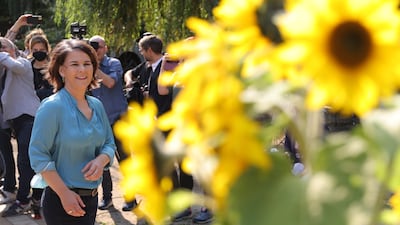Germany’s national election to replace Chancellor Angela Merkel has ended with the two main parties so close together that exit polls could not identify an immediate winner.
The conservative CDU bloc, Mrs Merkel’s group, was tied with the centre-left Social Democrats (SPD), with both winning 25 per cent of the vote, initial exit polls said.
The exit poll has a reputation for accuracy and could not split the two parties.
The Greens, who could become a major player in the next coalition government, won 15 per cent, the exit poll indicated.
Social Democrat Olaf Scholz had been leading CDU candidate Armin Laschet in opinion polls, but a poll on eve of the election indicated a tight election.
"The voters of this country have decided that the SPD should rise upwards and that is a big success, " Mr Scholz said.
"This is going to be a long election evening, that is certain. But it is also certain that many put their cross by the SPD because they want the next chancellor of Germany to be called Olaf Scholz."
He told supporters that his preferred outcome was for the SPD and Greens to secure a majority and to govern without a third partner.
"It was clear to us that without incumbent's bonus it would be a more open, a tighter and a tougher election campaign," Mr Laschet said. "This is a neck and neck race."
"We will do everything to form a conservative-led government, because Germany needs a future-oriented coalition that modernises our country."
The far-right, anti-immigrant AfD party and the liberal FDP each recorded 11 per cent of the vote, the exit polls found.
The anti-capitalist Left grouping scored only 5 per cent, and once the dust has settled might find themselves without a place in Parliament.
The SPD and CDU will now contact other parties looking to build a ruling coalition. Both have said they will not work with the AfD, leaving the Greens and the liberals as the preferred options.
The major parties have major differences on how to tackle climate change and the need for tax rises to pay for pandemic spending.
Green party candidate Annalena Baerbock has portrayed herself as a candidate for genuine change but has been trailing in third, opinion polls show.
"We wanted more. We didn't manage that, partly because of mistakes at the start of the campaign – mistakes I made," Ms Baerbock said.
"It makes sense that different parties talk to each other in different combinations."

In Berlin, voter Wiebke Bergmann, 48, said Mrs Merkel’s departure after 16 years makes this a “really special” election.
“I really thought hard about which candidate I want as next chancellor," Ms Bergmann said. "Until this morning I hadn’t made up my mind. None of the three really convinced me.
“All seem fine as human beings, but I’m not sure they can do a good job as next chancellor.”
German governments are routinely made up of coalitions, but this could be the first one in 16 years in which the CDU does not hold the top post.
Germans have two votes – one for a local MP to sit in the lower house of the federal parliament, the Bundestag, and one for a party list.
“I hope that as many citizens as possible will go and vote and make a very strong result for the SPD possible and give me the mandate to become the next chancellor of the Federal Republic of Germany,” Mr Scholz said after voting in Potsdam, near Berlin.

Hagen Bartels, 64, a voter in Berlin, said he was expecting “the surprise that the biggest party is not the SPD but probably the CDU”.
In Aachen, first-time voter Maite Hoppenz, 18, said climate change was “definitely a big topic for me because I think it will certainly have a big impact on my future”.

























